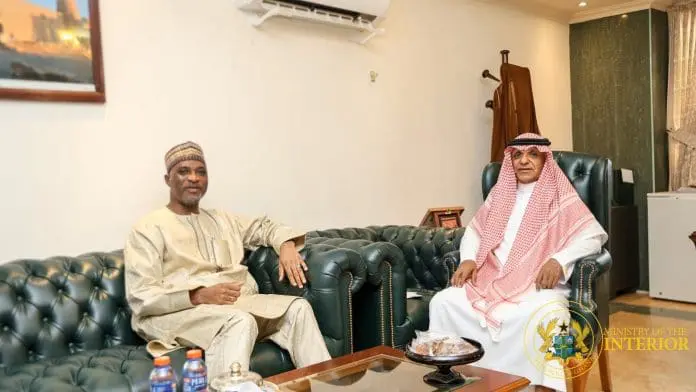By Benjamin Nii Nai,Ghana News
Copyright ghananewss

Ghana’s Interior Minister Muntaka Mohammed-Mubarak has concluded successful diplomatic engagements with Saudi Arabia, securing commitments for enhanced security cooperation between the two nations following high-level meetings in Riyadh.
The Minister met with his Saudi counterpart, Prince Abdulaziz bin Saud bin Nayef bin Abdulaziz, in the Saudi capital, where discussions focused on strengthening bilateral security collaboration with particular emphasis on border security, counter-terrorism initiatives, and capacity-building programs.
Following his return to Ghana, Mohammed-Mubarak expressed gratitude to Saudi Arabia’s Ambassador to Ghana, His Excellency Sultan Abdulrahman Al-Dakhel, for facilitating the diplomatic mission. The Minister presented a formal letter of appreciation to the Ambassador for onward delivery to Saudi Arabia’s Interior Minister, highlighting the significance Ghana places on the developing partnership.
The meeting underscored the growing momentum in Ghana-Saudi Arabia relations, highlighting the potential for increased cooperation in various fields, particularly in border security, counter-terrorism, and capacity building, according to official statements from Ghana’s Ministry of the Interior.
The diplomatic engagement comes as West Africa faces increasing security challenges, including terrorist activities in the Sahel region that have implications for border security across the sub-region. Ghana’s strategic location and relative stability make it an important partner for international security cooperation initiatives.
Prince Abdulaziz bin Saud bin Nayef bin Abdulaziz, who has served as Saudi Arabia’s Interior Minister since June 2017, warmly received the Ghanaian delegation, setting a positive tone for the bilateral discussions. The Saudi Interior Minister previously held positions under his uncle, former Crown Prince Muhammad bin Nayef, bringing extensive security expertise to the partnership.
The collaboration discussions explored potential areas of mutual benefit, including intelligence sharing, training programs for security personnel, and joint initiatives to combat transnational criminal activities. Both ministers emphasized their countries’ commitment to promoting global peace and security through enhanced cooperation.
Mohammed-Mubarak, who received his appointment as Interior Minister on January 30, 2025, following parliamentary vetting and approval, has prioritized strengthening international security partnerships as part of Ghana’s broader security strategy. The seasoned politician represents the Asawase Constituency and brings extensive parliamentary experience to his ministerial role.
The Saudi Ambassador assured continued support for developing cooperation initiatives between the two countries. Ambassador Al-Dakhel indicated his office remains open for further collaborative ideas and initiatives that would advance bilateral relations and mutual security interests.
Border security emerged as a priority area given Ghana’s position as a gateway to West Africa and Saudi Arabia’s experience managing extensive border regions in the Middle East. The partnership could facilitate knowledge transfer and technology sharing to enhance border management capabilities.
Counter-terrorism cooperation represents another crucial component of the partnership, particularly relevant as Ghana works to prevent spillover effects from regional terrorist activities. Saudi Arabia’s experience combating terrorism in the Middle East provides valuable insights for Ghana’s security planning.
Capacity-building initiatives discussed include training programs for Ghanaian security personnel, potential equipment sharing, and joint exercises designed to enhance operational capabilities. These programs would strengthen Ghana’s internal security apparatus while building long-term partnership foundations.
The diplomatic success reflects Ghana’s broader foreign policy strategy of diversifying international partnerships beyond traditional allies. Engaging with Middle Eastern partners like Saudi Arabia expands Ghana’s diplomatic reach and creates new opportunities for security and economic cooperation.
Regional security dynamics in West Africa have created urgency around international partnerships. The region faces escalating threats due to violent non-State actors, civic restrictions, political transitions and heightened humanitarian needs, making bilateral security cooperation increasingly valuable.
The formal gratitude letter presented to Ambassador Al-Dakhel symbolizes Ghana’s commitment to protocol and diplomatic courtesy in building lasting partnerships. Such diplomatic gestures often facilitate smoother cooperation implementation and demonstrate respect for Saudi Arabia’s contributions to regional security.
Both nations expressed optimism about future collaboration prospects, with officials indicating that initial agreements could lead to expanded partnerships across multiple sectors. The security cooperation framework may serve as a foundation for broader bilateral relations including trade and investment opportunities.
The partnership timing aligns with Ghana’s efforts to modernize its security infrastructure and capabilities. International partnerships provide access to best practices, technology, and training that enhance national security effectiveness while building regional stability.
Implementation timelines and specific program details remain under discussion, with both sides committed to developing concrete action plans that translate diplomatic agreements into operational security enhancements. Regular follow-up meetings are expected to monitor progress and identify additional cooperation opportunities.
The Ghana-Saudi Arabia security partnership represents a significant diplomatic achievement that could serve as a model for similar arrangements with other Middle Eastern partners, demonstrating Ghana’s growing influence in international security cooperation initiatives.



